- Home
- Harry Harrison
The Hammer and The Cross thatc-1 Page 5
The Hammer and The Cross thatc-1 Read online
Page 5
A few yards away the jarl of the Small Isles bent over his game at knucklebones. He finished his cast, to show a proper spirit of independence, but then straightened and walked hopefully over to the little group of leaders.
“You called out my name, Sigurth.”
“You have five ships? Good. We think the English and their little King Edmund are trying to play stupid games with us. Resisting, trying to bargain. No good. We want you to go out and show them who they're dealing with. Take your ships up the coast, then round to the west. Push inland, do as much damage as you can, burn some villages. Show them what could happen if they provoke us. You know what to do.”
“Yes. Done it before.” He hesitated. “But what about spoils?”
“Anything you get, it's yours. But loot isn't what this is about. Do something that they will remember. Do it as Ivar would do it.”
The jarl grinned again, but more hesitantly, as most men did when the name of Ivar Ragnarsson the Boneless was mentioned.
“Where will you land?” asked Ubbi.
“Place called Emneth. I was there once before. Found me a nice little chicken.” The jarl's grin was cut off this time by a sudden movement from Ivar.
Sigvarth had given a stupid reason. He was not going on this mission to repeat the escapades of his youth. It was unwarriorlike. It was also the kind of thing Ivar did not discuss.
The moment passed. Ivar leaned back in his chair and turned his attention elsewhere. They knew Sigvarth was not the best in the Army—one of the reasons they were letting him go.
“Do the job and never mind chickens,” said Sigurth. He waved a hand in dismissal.
At least Sigvarth knew the mechanics of his profession. At dawn two days later his five ships were sweeping cautiously into the mouth of the river Ouse, with the tide still on the flow. An hour's rowing at high tide took them as far inland as the water would bear, until the boats' keels grated on the sand. The dragon-prows nuzzled in, the men poured ashore. Instantly the assigned ship-guards backed water, pulled their wave-coursers offshore to the mudbanks, and waited there for the ebb tide to ground them out of reach of any counterattack from the local levies.
The youngest and swiftest men of Sigvarth's command had already moved out. Finding a small stud of ponies they cut down the lad in charge and raced off to round up more. As they captured the horses they sent them back to the main body. By the time the sun struggled through the morning mists a hundred and twenty men were pounding along the twisted and muddy paths towards their goal.
They rode in a hard, disciplined group. Keeping together, without advance or flank guards, counting upon strength and surprise to drive through any resistance. When their path took them up to any inhabited place—farmhouse, garth, or hamlet—the main body halted for as long as it might take a man to piss. The lighter men on the better horses swept round to the flanks and rear and halted, to prevent any escapes that might raise the alarm. Then the main body attacked. Their orders were simple, so simple that Sigvarth had not even bothered to repeat them.
They killed every person they met—man, woman, child, or babe in cradle—immediately, without halting to ask questions or seek for entertainment. Then they remounted and drove on. No looting, not yet. And, on the strictest of instructions, no fire.
By midday a corridor of death was slashed through the peaceful English countryside. Not a single person was left alive. Far behind the attackers men were beginning to notice that their neighbors were not astir, were finding horses missing and corpses in fields, were ringing the church bells and lighting their alarm beacons. But ahead of the Vikings there was not the slightest suspicion of their deadly presence.
The party from Emneth had set out considerably later in the day than Sigvarth's men. They had had to wait for the reluctant contingents from Upwell, Outwell, and beyond. Then there was a long delay while the landholders of the area greeted each other and ponderously exchanged courtesies. Next Wulfgar decided that they could not start on empty bellies and generously called for mulled ale for the leaders and small beer for the men. It was hours after sunrise when the hundred and fifty armed men, the military service of four parishes, set off down the road through the marsh which would lead them across the Ouse and in the end to Norwich. Even at this early stage they were already trailed by stragglers whose girths had broken, or whose bowels had loosened, or who had slipped off to make their farewells to their own wives or to other men's. The troop rode without precautions and without suspicion. The first inkling they had of the Vikings' presence was as they came round a bend in the road and saw heading toward them a tight-packed column of armed men.
Shef was riding just behind the leaders, as close to Edrich the King's Thane as he dared to go. Speaking up at the council had got him Edrich's favor. No one would send him back while Edrich was watching. Yet he was still there, as Alfgar had taken pains to point out to him, as a smith, not as a freeman on military service. At least he still had his self-forged sword.
Shef saw them as soon as the others, and heard the startled cries of the leaders.
“Who are those men?”
“It's the Vikings!”
“No—it can't be! They're in Suffolk. We're still negotiating.”
“It's the Vikings, you porridge-brains! Get your fat arses off your horses and form up for battle. You there, dismount, dismount! Horse-holders to the rear. Get your shields off your backs and form up.”
Edrich the king's thane was by this time bellowing at the top of his voice, whirling his horse round and riding into the tangled confusion of the English column. Slowly men began to appreciate the situation, to drop from their saddles, to root desperately for weapons that they had stowed for comfortable riding. To edge toward the front or toward the rear, depending on personal inclination, boldness or cowardice.
Shef had few preparations to make—the poorest man in the column. He dropped the reins of his nag, a grudging loan from his stepfather, pulled the wooden shield from his back, and loosened his only weapon in its sheath. All the armor he had was a leather jacket with such studs as he had been able to collect sewn onto it. He took position immediately behind Edrich and stood ready, his heart beating fast and excitement clutching his throat—but all outweighed by a vast curiosity. How would the Vikings fight? What was the nature of battle?
On the Viking side, Sigvarth had grasped the situation as soon as he saw the first riders coming toward him. Dropping his heels from their tucked-up riding position, he rose in his saddle, turned, and bellowed a brief command to the men behind him. Instantly the Viking column dissolved in practiced disarray. In a moment they had all dismounted. One man in five, already told off for the task, seized horse-reins and led the mounts to the rear, bending down, as soon as they were clear of the throng, to drive pegs into the ground and knot the reins to them. As soon as this was done, the two dozen horse handlers clustered in the rear and formed a reserve.
Meanwhile the others halted for the space of twenty heartbeats. Some in grim silence, others swiftly reknotting their shoes, or gulping water or pissing as they stood. Then all simultaneously unslung shields, loosened swords, passed their axes to shield-hands, poised the long battle-spears in their casting-hands. Without further words they spread into a line two-deep, from edge to edge of the road, where it dissolved into swamp on either side. At a single shouted word from Sigvarth at they stepped forward at a brisk walk, the flanks falling back until the line formed a broad shallow arrow pointing directly at the English levies. At its apex was Sigvarth himself. Behind him his son Hjörvarth led a picked dozen—the men who, when the English line was broken, would sweep through and round to the rear, cutting men down from behind and turning setback into rout.
Facing them, the English had formed into a rough line three- or four-deep, also extending from edge to edge of the road. They had solved their problem with the horses by abandoning them, dropping reins and leaving the animals to stand or trot away. Among the mob of ponies there were also a few men who had slun
k quietly to the rear. Not many. After three generations of raid and war many of the English had personal grudges to pay off—while none wished to be exposed to the derision of his neighbors. Shouts of encouragement rose from all the men who thought their rank entitled them to do so. But no orders. Glancing round, Shef saw that he was very much alone, immediately behind the group of armored nobles. As the Viking arrow drove toward the English line, men had unconsciously edged to left or right. Only the most determined were there to take the first blow, where the weight would fall if Wulfgar and his colleagues were to fail. The wedge formation was said to be the invention of the Viking war-god. What would happen when it struck?
Spears began to fly from the English line, some falling short, some batted aside by the shields of the leaders. Suddenly, simultaneously, the Vikings began to trot forward. One, two, three paces, and the throwing arms of the leaders drew back and a shower of javelins whirred at the English center. In front of him, Shef saw Edrich adroitly twist his shield-boss so that one spear flew over his head and far to the back of the line, and smash another with the edge so that it fell at his feet. A few paces to one side, a noble dropped his shield to block a spear aimed at his belly, choked, and fell sideways as another ripped through his beard and throat. Another landholder cursed as three spears found his shield at once, tried to knock them free with his sword, then frenziedly struggled to pull the strap from his elbow and drop the now-clumsy encumbrance dragging down his arm. Before he could succeed the Viking wedge was on them.
In front of him Shef saw the Viking leader swing a mighty blow at Wulfgar. The Englishman caught it on his shield, tried to stab in reply with his sword. But the Viking had already recovered and swung again with all his force, backhand. Once more Wulfgar parried, with a mighty clang as his own blade met the Viking's, but he was already off balance. With a sudden thrust the Viking clubbed him in the face with his sword-pommel, thrust a shield-boss into his ribs, and hurled him aside by main force. As he stepped forward to stab, Shef sprang at him.
For all his size the Viking leader was amazingly fast on his feet. He jumped back a pace and slashed at the boy's unarmed head. Shef had realized two things already from his three heartbeats' observation of real battle: One, in battle everything must be done with full force, with none of the unconscious restraint of training or practice. He put all his smithy-hardened muscle into the parry. Two, in battle there could be no interval or pause between blows. As the Viking swung again, Shef was already braced for him. This time his parry caught the blow higher up. He felt a clang and a snap and the fragment of a blade whirred over his head. Not mine, thought Shef. Not mine! He stepped forward and stabbed exultantly for the groin.
Something knocked him sideways and backwards. He staggered, caught his balance, and found himself shoved aside again by the figure of Edrich, bellowing something in his ear. As he glanced round Shef realized that while he exchanged blows with their leader, the tip of the Viking wedge had broken through. Half a dozen English nobles lay on the ground. Wulfgar, still on his feet, was backing dazedly toward Shef, but a dozen Vikings were facing him, pouring through the broken line. Shef found himself shouting, brandishing his sword, daring the foremost of the Vikings to come on. For a heartbeat the man and the boy stared into each other's eyes. Then the man wheeled left, following his orders, moving through the gap to roll up the English line and drive the flankers into the swamp in disorder and confusion.
“Run for it!” shouted Edrich. “We're beat. Nothing to do now. Run now and we can get away.”
“My father,” shouted Shef, lunging forward to try to grasp Wulfgar by the belt and haul him back.
“Too late, he's down.”
It was true. The dazed thane had taken another smashing blow on the helmet and staggered forward, to be enveloped by a wave of enemies. The Vikings were still fanning sideways, but at any moment some would press forward and overwhelm the few men left standing in the center. Shef found himself seized by the collar and hustled, half-choking to the rear.
“Damned fools. Half-trained levies. What can you expect? Grab a horse, boy.”
In seconds Shef was cantering down the track the way he had come. His first battle was over.
And he had run from it within seconds of the first blow being struck.
Chapter Four
The reeds at the marsh's edge moved slightly in the morning breeze. They moved again and Shef peered out at the empty countryside. The Viking raiders were gone.
He turned and waded back through the reeds to the path he had found the previous evening. The small island was hidden by low trees. Edrich the king's thane was eating the cold remains of their dinner from the night before. He wiped greasy fingers on the grass and raised his eyebrows.
“Nothing in sight,” Shef said. “Quiet. No smoke that I could see.”
They had fled the battle, knowing it was lost, seeking only to save their own lives. There had been no sign of pursuit when they abandoned their horses and fled on foot into the marsh where they had spent the night—an oddly comfortable and pleasant night for Shef. He thought about it with mixed feelings of both pleasure and guilt. It had been an island of peace in a sea of anxiety and trouble. Just for one evening there had been no work to do, no duty that could possibly be performed. All they had to do was hide, protect themselves, and stay as comfortable as possible. Shef had splashed off into the marsh and quickly found them a dry island in the midst of the pathless fen, where it was certain that no stranger would ever penetrate. It had been easy to put up a shelter made out of the reed which the marsh-folk used for thatching. Eels had been snared in the sluggish water, and Edrich, after brief consideration, had seen no harm in making a fire. The Vikings had other things to do and weren't going to come splashing all the way over here just because of a bit of smoke.
In any case, before darkness fell, they could see smoke rising all around them. “The raiders on their way back,” said Edrich. “They don't mind sending up signals when they're retreating.”
Had he ever run from a battle before? Shef asked cautiously, nagged by the worry that kept on surfacing every time memory brought back the picture of his stepfather going down, engulfed by a tide of enemies. “Many times,” Edrich replied, in the curious camaraderie of this day stolen out of time. “And don't think that was a battle. Just a skirmish. But I've run for it often. Too often. And if everybody did that we'd have a lot fewer dead men on our side. We never lose very many while we're standing and fighting, but once the Vikings break through it's just a slaughter. Just stop a moment and think of it—every man who gets off the field is saved for another stand-up fight on even terms another day.
“Trouble is,” he smiled grimly, “the more often it happens the less likely most people are to be willing to try again. They lose heart. And there's no need for it. We lost yesterday because nobody was ready, not physically, not in their minds either. If they'd spend a tenth of the time they spend in whining afterwards in getting ready beforehand, we'd have no need ever to lose a battle. As the proverb says: ‘Often the deed—late in doom diminishes, in all successes. Starves he later.’ Now show me your blade.”
Face unmoving, Shef drew it from its scuffed leather scabbard and passed it over. Edrich turned it thoughtfully in his hands.
“It looks like a hedger's tool,” he remarked. “Or a reed-cutter's bill. Not a real weapon. Yet I saw the Viking jarl's sword snap on it. How did that happen?”
“It is a good blade,” Shef replied. “Maybe the best in Emneth. I made it myself, forged in strips. Much of it is soft iron. I beat it out myself from the iron blooms they send us from the South. But there are layers too of hard steel. A thane from March gave me some good spearheads in payment for work I did for him. I melted and beat them out, and then I twisted the iron and steel strips round each other and forged the whole into a blade. The iron lets it bend, the steel gives it strength. In the end I welded on a cutting edge of the hardest steel I could find. Four man-loads of charcoal the whole work cost me.
”
“And with all that work you made it short and single-edged, like a work-tool. Put on a plain ox-bone handle, with no guard. And then you left it out in the wet and let it get rusty.”
Shef shrugged. “If I swaggered round Emneth with a warrior's weapon on my hip and serpent-patterns glittering on the blade, how long would I have kept it? The rust is just enough to discolor the blade. I make sure it eats no further.”
“That was the other question I meant to ask you. The young thane said you were not a freeman. You behave as if you were in hiding. Yet in the fight you called Wulfgar ‘father.’ There is some mystery here. The world is full of thanes' bastards, God knows. But no one tries to enslave them.”
Shef had faced the same question many times, and in another time or place would not have answered. But in the island in the fen, speaking one to another, status forgotten, the words came.
“He is not my father, though I call him that. Eighteen summers ago the Vikings raided here. Wulfgar was away from Emneth then, but my mother, the lady Thryth, was here, with her baby son Alfgar—my half brother, her child and Wulfgar's. A servant got Alfgar away when the raiders came in the night, but my mother was taken.”
Edrich nodded slowly. All this was familiar enough. But still his question was not answered. There was a system in these matters, at least for those of rank. After a while, surely, the husband might have expected to hear from the slave-marts of Hedeby or Kaupang, to tell him such and such a lady was ransomable, at a price. If he did not, then he could have considered himself a widower, free to marry again, to set his fine silver bracelets on another woman who would rear his son. Sometimes, it was true, such arrangements were disturbed by the arrival, twenty years later, of some withered crone who had managed to outlive her usefulness in the North and bribe her way, God knew how, onto a ship that would take her home. But not often. Neither case explained the young man sitting before him.

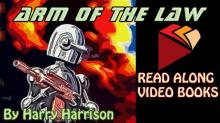 Arm of the Law
Arm of the Law The Velvet Glove
The Velvet Glove The K-Factor
The K-Factor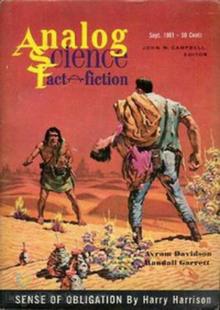 Sense of Obligation
Sense of Obligation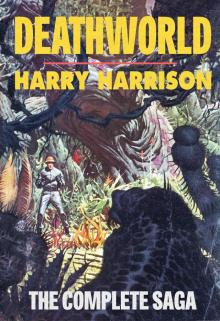 Deathworld: The Complete Saga
Deathworld: The Complete Saga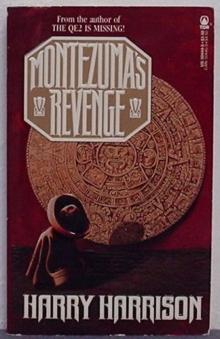 Montezuma's Revenge
Montezuma's Revenge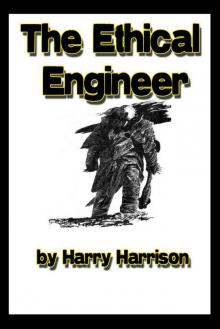 The Ethical Engineer
The Ethical Engineer The Stainless Steel Rat Returns
The Stainless Steel Rat Returns The Misplaced Battleship
The Misplaced Battleship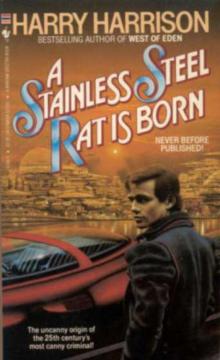 The Stainless Steel Rat is Born
The Stainless Steel Rat is Born Planet of the Damned bb-1
Planet of the Damned bb-1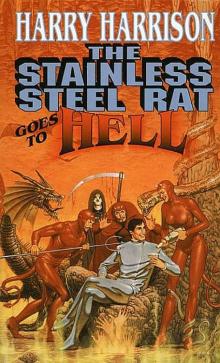 The Stainless Steel Rat Goes to Hell ssr-10
The Stainless Steel Rat Goes to Hell ssr-10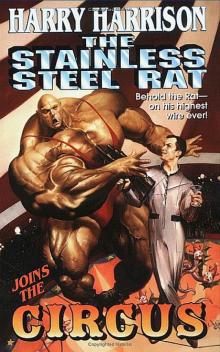 The Stainless Steel Rat Joins the Circus ssr-11
The Stainless Steel Rat Joins the Circus ssr-11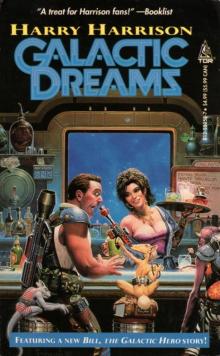 Galactic Dreams
Galactic Dreams The Harry Harrison Megapack
The Harry Harrison Megapack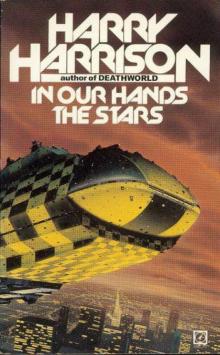 In Our Hands the Stars
In Our Hands the Stars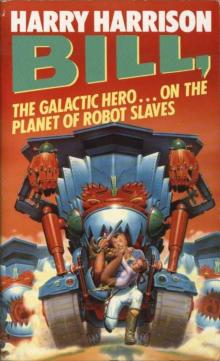 On the Planet of Robot Slaves
On the Planet of Robot Slaves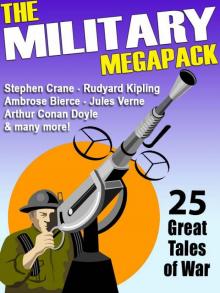 The Military Megapack
The Military Megapack Make Room! Make Room!
Make Room! Make Room! Wheelworld
Wheelworld Winter in Eden e-2
Winter in Eden e-2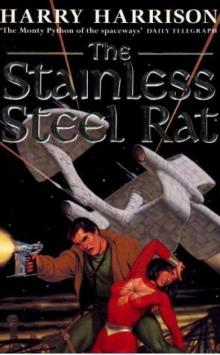 The Stainless Steel Rat
The Stainless Steel Rat The Stainless Steel Rat Goes to Hell
The Stainless Steel Rat Goes to Hell Harry Harrison Short Stoies
Harry Harrison Short Stoies Stainless Steel Rat 11: The Stainless Steel Rat Returns
Stainless Steel Rat 11: The Stainless Steel Rat Returns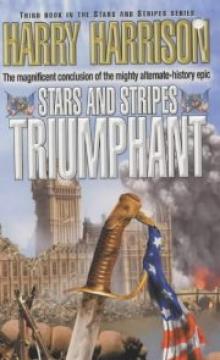 Stars and Stripes Triumphant sas-3
Stars and Stripes Triumphant sas-3 West of Eden
West of Eden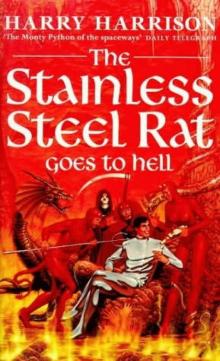 The Stainless Steel Rat Go's To Hell
The Stainless Steel Rat Go's To Hell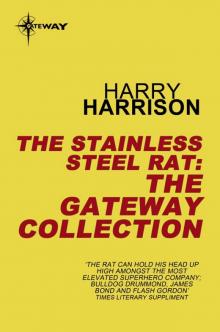 The Stainless Steel Rat eBook Collection
The Stainless Steel Rat eBook Collection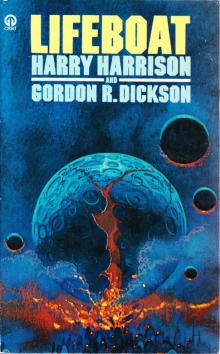 Lifeboat
Lifeboat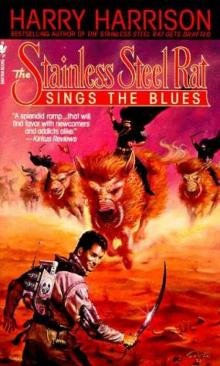 The Stainless Steel Rat Sings the Blues
The Stainless Steel Rat Sings the Blues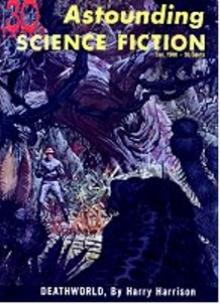 Deathworld tds-1
Deathworld tds-1 On the Planet of Zombie Vampires
On the Planet of Zombie Vampires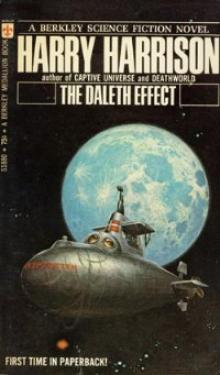 The Daleth Effect
The Daleth Effect On The Planet Of The Hippies From Hell
On The Planet Of The Hippies From Hell The Turing Option
The Turing Option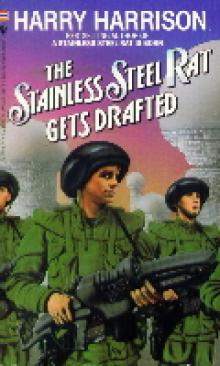 The Stainless Steel Rat Gets Drafted
The Stainless Steel Rat Gets Drafted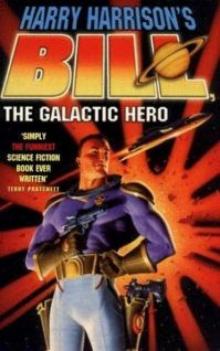 Bill, the Galactic Hero btgh-1
Bill, the Galactic Hero btgh-1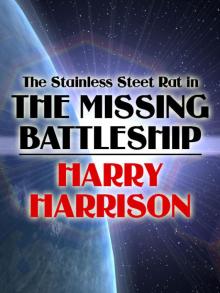 The Stainless Steel Rat in The Missing Battleship
The Stainless Steel Rat in The Missing Battleship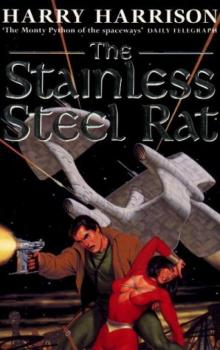 The Stainless Steel Rat ssr-1
The Stainless Steel Rat ssr-1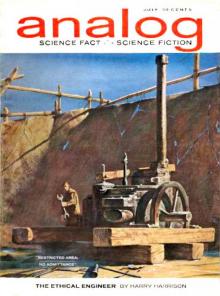 The Ethical Engineer (the deathworld series)
The Ethical Engineer (the deathworld series) The Stainless Steel Rat Saves the World ssr-3
The Stainless Steel Rat Saves the World ssr-3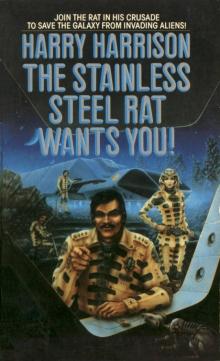 The Stainless Steel Rat Wants You
The Stainless Steel Rat Wants You One King's Way thatc-2
One King's Way thatc-2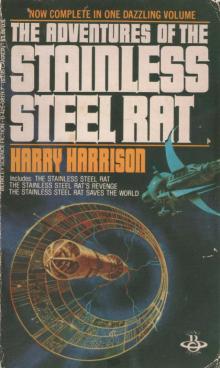 The Stainless Steel Rat Saves The World
The Stainless Steel Rat Saves The World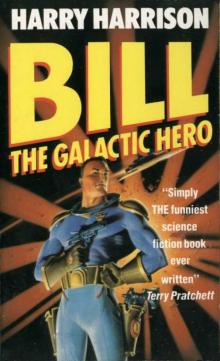 Bill, the Galactic Hero
Bill, the Galactic Hero Stars & Stripes Forever
Stars & Stripes Forever Stars and Stripes In Peril sas-2
Stars and Stripes In Peril sas-2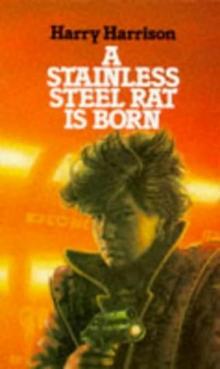 A Stainless Steel Rat Is Born ssr-6
A Stainless Steel Rat Is Born ssr-6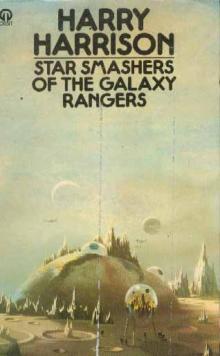 Star Smashers of the Galaxy Rangers
Star Smashers of the Galaxy Rangers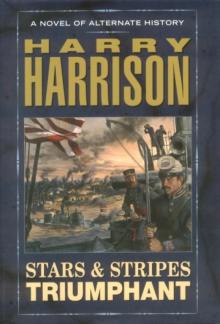 Stars & Stripes Triumphant
Stars & Stripes Triumphant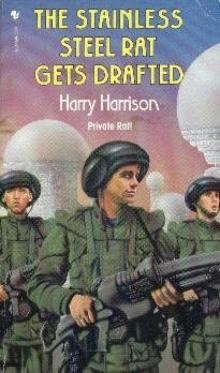 The Stainless Steel Rat Gets Drafted ssr-7
The Stainless Steel Rat Gets Drafted ssr-7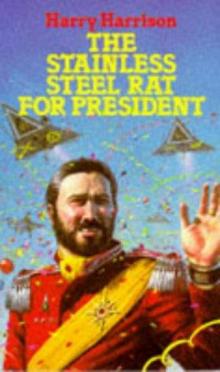 The Stainless Steel Rat for President ssr-5
The Stainless Steel Rat for President ssr-5 The Hammer & the Cross
The Hammer & the Cross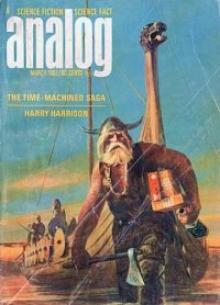 The Technicolor Time Machine
The Technicolor Time Machine The Hammer and The Cross thatc-1
The Hammer and The Cross thatc-1 King and Emperor thatc-3
King and Emperor thatc-3 Return to Eden
Return to Eden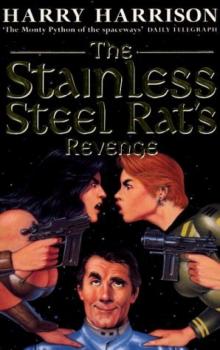 The Stainless Steel Rat’s Revenge ssr-2
The Stainless Steel Rat’s Revenge ssr-2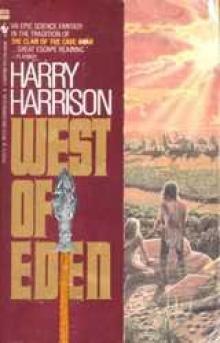 West of Eden e-1
West of Eden e-1 Return to Eden e-3
Return to Eden e-3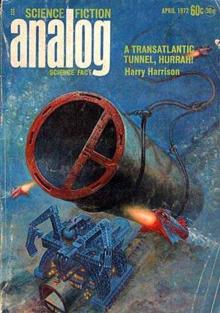 A Transatlantic Tunnel, Hurrah!
A Transatlantic Tunnel, Hurrah!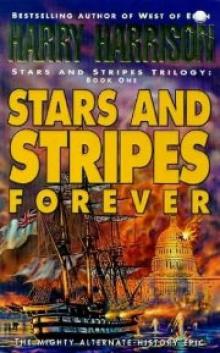 Stars and Stripes Forever sas-1
Stars and Stripes Forever sas-1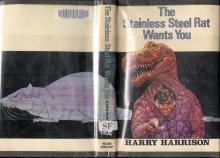 The Stainless Steel Rat Wants You ssr-4
The Stainless Steel Rat Wants You ssr-4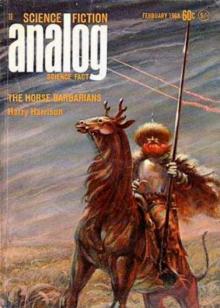 The Horse Barbarians tds-3
The Horse Barbarians tds-3 Planet of the Damned and Other Stories: A Science Fiction Anthology (Five Books in One Volume!)
Planet of the Damned and Other Stories: A Science Fiction Anthology (Five Books in One Volume!) On the Planet of Bottled Brains
On the Planet of Bottled Brains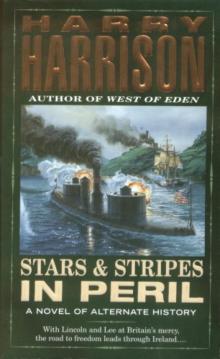 Stars And Stripes In Peril
Stars And Stripes In Peril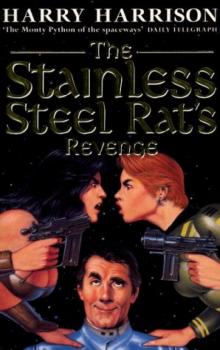 The Stainless Steel Rat's Revenge
The Stainless Steel Rat's Revenge Captive Universe
Captive Universe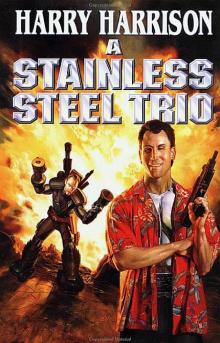 The Stainless Steell Rat Sings the Blues ssr-8
The Stainless Steell Rat Sings the Blues ssr-8 Harry Harrison! Harry Harrison!
Harry Harrison! Harry Harrison! Winter in Eden
Winter in Eden On the Planet of Tasteless Pleasures
On the Planet of Tasteless Pleasures